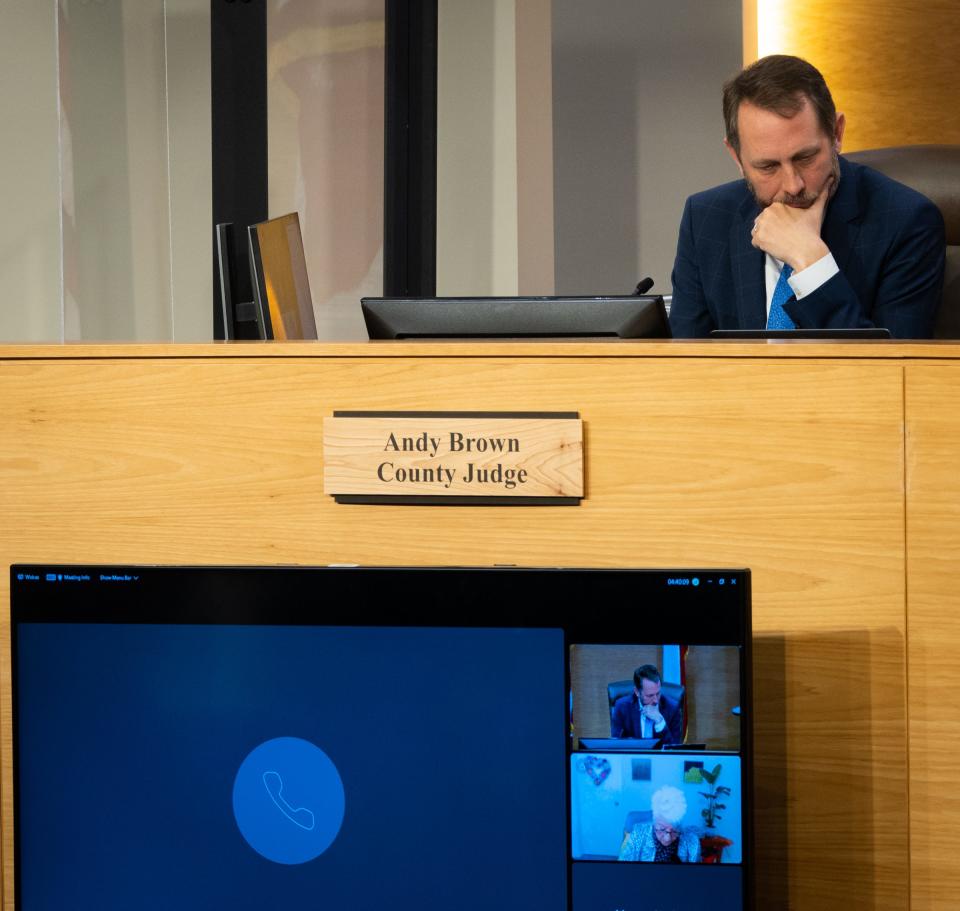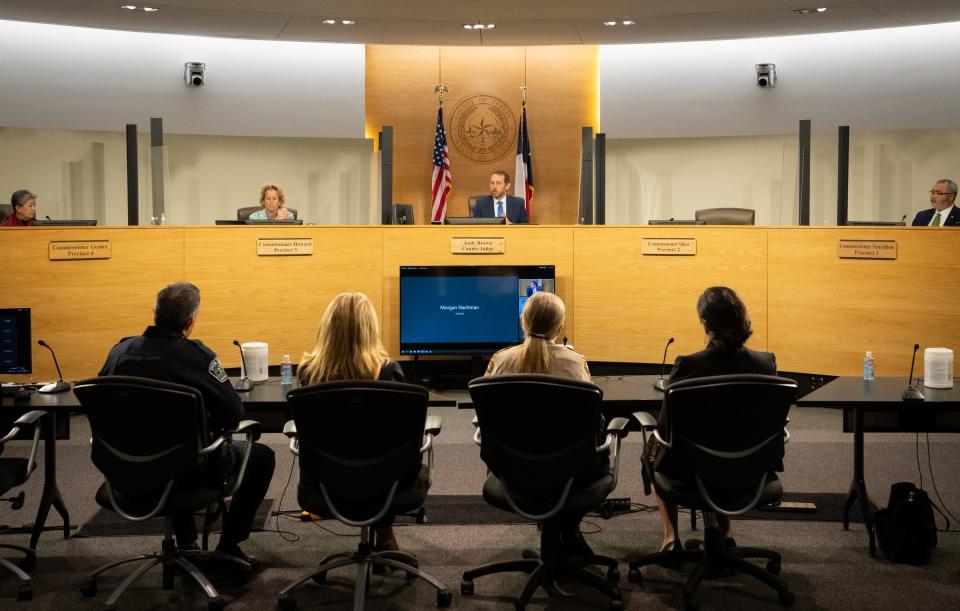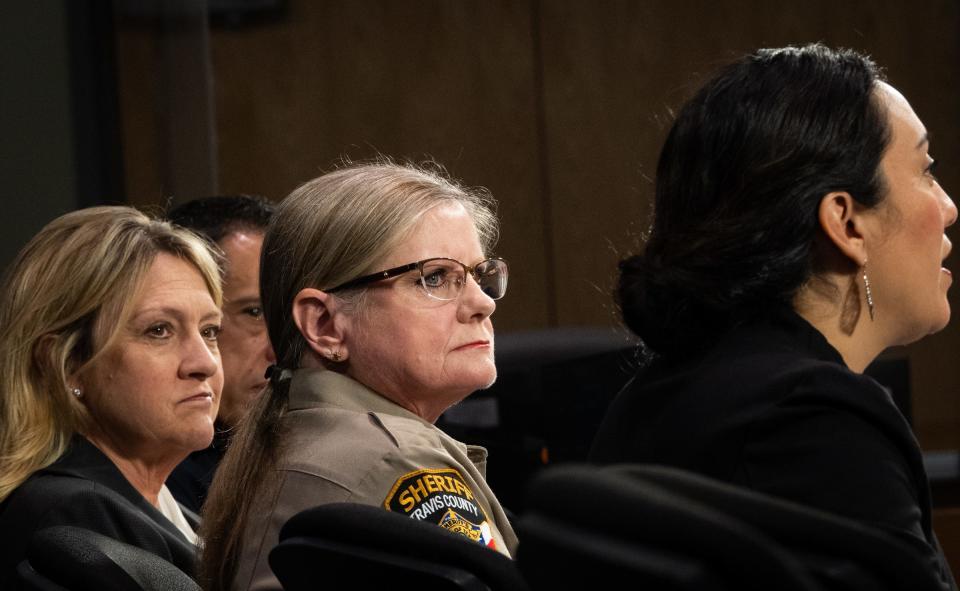Travis County takes first steps on mental health diversion center to keep people out of jail
Travis County on Tuesday took its first steps in creating diversion center that would provide shelter and support services for people experiencing a mental health crisis instead of putting them in jail.
On Tuesday, commissioners approved a resolution for development of a new behavioral health diversion center, and directed county staff to begin the process of identifying funding and the functions of the facility, including numbers of beds and the kinds of services that would be available.
It’s a long process that will take several more votes before the center comes to fruition, County Judge Andy Brown said. How much that will cost, and what those services will look like is still being determined.
Mental health has been at the forefront of discussions in the wake of the COVID-19 pandemic as local decision makers and first responders find ways to help people experiencing a mental health crisis. Travis County joins its neighbors in Hays and Williamson counties in addressing this issue away from jail.
More:Travis County's Expunction Expo to clear more criminal records in May

In July, Hays County launched a countywide needs assessment to determine the best approach for building a mental health center in the county that would divert people in a mental health crisis away from jail. Hays County Commissioners in 2021 allocated $250,000 for the assessment, which is being conducted by the Meadows Mental Health Policy Institute.
Williamson County opened a new mental health diversion center in 2022 that has shown early signs of success in keeping people away in a mental health crisis away from jails and hospitals.
For law enforcement, the diversion center is long overdue.
Williamson County: Officials laud Diversion Center for keeping people in crisis out of jail
Expanding the tool kit
Sheriff Sally Hernandez, who supported the move, said since taking office in 2017 she has seen the percentage of inmates with mental health issues increase, and they are staying longer in jail because they have no other place to go. She said this is especially true for people that are deemed incompetent to stand trial because the wait list for state hospitals are very long.
She said the sheriff’s office has a crisis intervention team, and trained deputies, that respond to people in mental health crisis, but the options of where to take somebody are limited to an emergency room or jail.
Austin Police Chief Joe Chacon shared similar thoughts saying that while Austin police officers are trained to deescalate the situation there are limited options to place someone, and often then end up in the jail.
“This is a broad and good step in the right direction,” Chacon said. “Because we know we are not going to arrest our way out of these issues.”
Geronimo Rodriguez chief advocacy officer with Ascension Seton also commented in support of this move saying "on behalf of employees, doctors, and nurses, we support the goal of providing clinically appropriate mental health services and believe this is a step in the right direction."
In May 2022, the Travis County Commissioners Court employed Dell Medical School to lead a 10-month consultation as part of a $250,000 contract. A steering committee, made of 17 county leaders, defined the specific problem as “people becoming trapped in or cycle through jail waiting for behavioral health services and solutions.
The committee developed five priorities, including the creation of a diversion center.
Brown said the county jail is the largest mental health facility and enough is not being done to invest in mental health resources.
“Once done, this facility will reduce the number of people entering the jail with mental health needs by offering the diversion center option and significantly reducing the number of people reentering the jail,” Brown said. “Just one day in jail can derail jobs, families and opportunities. We can make our community safer and more stable when we help someone avoid the consequences of incarceration and instead connect them with needed services.”
Mental health: Amplify Center opens as state's first young adult mental health clinic

A growing need for mental health care in Austin
Tuesday’s vote comes after a nearly year-long study to find solutions for the large and growing number of people within the county jail needing care for mental health and substance use disorders.
According to county data, when the project started in May 2022, more than 900 people had a mental health identifier in the Travis County jail. As of January 2023, there were still 873 people in the same circumstance.
About 75% of those arrests were for misdemeanors, often for nonviolent, mental health-related disorder behaviors. Criminal trespassing accounted for 55% of the multiple arrests, data shows.
Had alternative interventions been in place, many of these individuals might have received care for their mental health disorder in a therapeutic and less restrictive setting than jail, the report states.
Right now, people who are experiencing a mental health crisis often times end up in jail or in an emergency room, which acts as a holding space, but without the proper treatment, they continue to cycle though the system.
The goal is to not only establish a place for people to go, Brown said, but also provide support services for people so they heal and stay out of the system.
"Our emergency room is not the right place and our jail is not the right place,” said Commissioner Ann Howard. “People need access to treatment and support at the right time, in the right place. This is not rocket science. This is about partnerships and listening and bringing resources together.”

Diversion center just one piece of the puzzle
Several stakeholders on the steering committee, which includes criminal justice advocates and leaders, law enforcement officials and health care leaders and professionals, said on Tuesday that the building was just one part of the solving this issue.
The report, released last week, will be presented to the commissioners court on Thursday and identifies four other recommendations that also aim at helping solve the problem, including:
Modernizing the County’s data collection method and finding ways to make it easier to share that data between hospitals, jails and court systems.
Piloting at least three housing programs − a bridge shelter, emergency shelter and a boarding home − while the county works to build permanent supportive housing through its $110 million program allocation and Austin works toward its $515 million homeless supportive housing goal
Increasing the number of certified and trained mental health counselors throughout the mental health and criminal legal systems
Ensuring an attorney is present at first appearance for all people, namely at magistration.
Hernandez said that while a diversion center is a step in the right direction, focusing on the mental health and support service programs within the center is necessary in working together to solve this problem.
“This is a huge problem, and everyone has to work together on it,” Hernandez said.
Howard, in a press conference Tuesday, said that as the county begins to develop this center it will include incorporating the different systems – law enforcement, health care, housing and workforce – to be successful.
"As we build out and pilot these things, we will be using that fuller report because it was tailored to this population,” Howard said. “This is not the answer to all our mental health struggles in Travis County. There are many unmet needs. But this is laser focused on a population that is cycling in and out of street, hospital and jail and that is expensive to their lives and our taxpayers.”
What’s next for the Travis County diversion center?
County staff will take the next several months to look into funding options, including grants and federal funding. A deeper dive into the report will also determine the number of beds and support services that should be available. Staff will present their finding to the commissioners court for approval.
The City of Austin will also look at how to help these efforts.
Council Member Ryan Alter, who will help lead the effort, told the American-Statesman that the city will begin to work with the county in determining what exactly is needed, including funding, so the project is successful.
"We will be looking at how to support efforts to make this happen," Alter said. "We want to be a great partner to bring this to fruition because this is something that is sorely needed."
This article originally appeared on Austin American-Statesman: Travis County takes first steps with mental health diversion center

